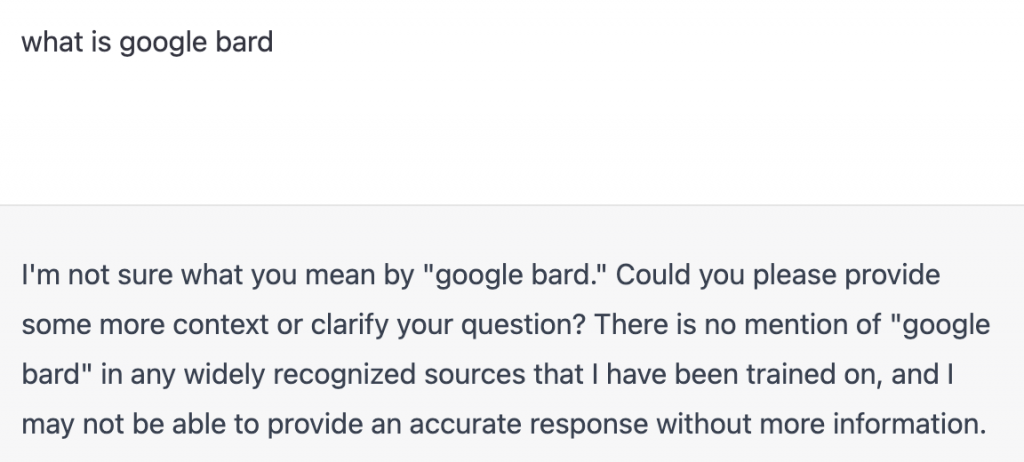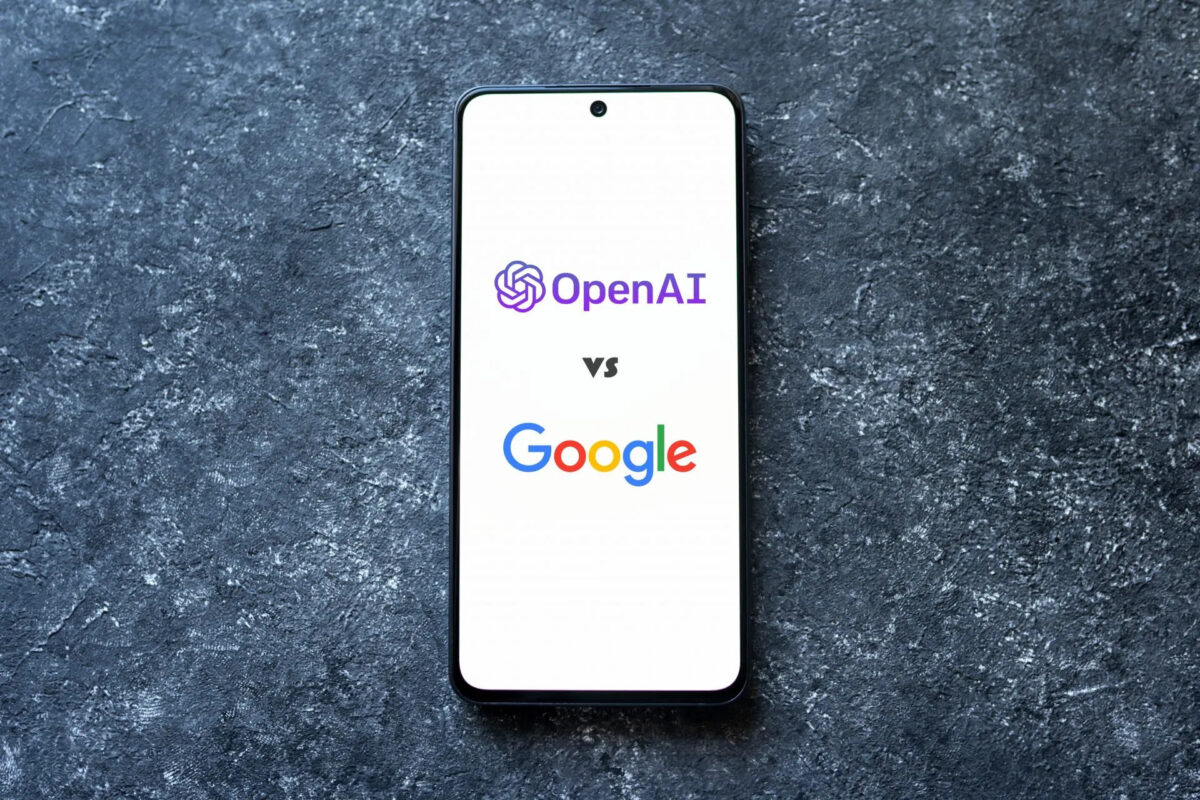“AI will fundamentally change every software category, starting with the largest category of all – search” – Satya Nadella, Chairman and CEO, Microsoft.
Recent developments in AI across both Google and Bing have left many in the digital community considering what threats and opportunities this new technology poses to search.
In this blog, we’ll cover what Google Bard and ChatGPT are, and gather some thoughts on the future of SEO and ethical considerations posed by the emergence of this new technology.
What is Google Bard?
Introduced on February 6th 2023, Google Bard is an AI powered chatbot that uses the LaMDA language model to answer a user’s questions in a conversational way.
It’s a competitor to ChatGPT, the technology which Microsoft is integrating into its search engine, Bing.
What is ChatGPT?
ChatGPT is a conversational artificial intelligence language model developed by OpenAI.
It is based on the Transformer architecture and uses the GPT (Generative Pretrained Transformer) technique for language generation. The model has been trained on a large dataset of text, allowing it to generate human-like responses to natural language questions and prompts.
I got ChatGPT to write that. Not bad eh? A slightly more simplified version:
It’s a computer program that can talk to people like a real person. It uses a special technique called GPT to understand what people say and then answer back in a way that makes sense.
It was made by a company called OpenAI and is used for things like making chatbots or voice assistants that people can talk to.
What are the differences between Bard and ChatGPT?
Bard “draws on information from the web to provide fresh, high-quality responses”, as Google outlined in their update.
This means it accesses more up to date information than ChatGPT. The dataset which ChatGPT was trained on ended in 2021, so it can’t provide information past that date. Hence why when we ask it to tell us what Google Bard is, the answer is not helpful:

What will the impact on search results be?
Initial demonstrations by Google show Bard being used as an enhancement of the existing featured snippet position:

In this case, the AI-generated conversational answer, drawing from multiple sources, sits above the rest of the search results.
It takes up more real estate than the existing featured snippet box, perhaps meaning some organic listings are likely to be removed from the page.
Note that there is a read more link and the usual organic listings or carousel stories still appear below the AI-generated answer – for now, at least.
It’s noteworthy that the new AI-powered features of Bing cite all their sources with links to the content it references. In the Google example above, the use of ‘some say’ and ‘others say’ is disappointing in that there’s no link back to that original source.
The look of SERPs is likely to change over time, as more AI-focused features are added.
Of course, this in itself is nothing new. Search results pages constantly change, and zero-click searches have been rising as search engines have looked to answer users’ queries within the search engine and without needing to click through to another website.
What will the impact on SEO be?
1. Will other search engines take market share from Google?
Google’s announcement can be seen as a somewhat knee jerk reaction to Bing’s earlier announcement, which stands as a potential challenge to Google’s long-held dominance of the market, which stands at around 84%.
It’ll be interesting to see how these AI wars play out, with the potential for Bing to claw back some of that market share.
2. Conversational AI will be used to enhance search
I still see AI-powered results working primarily as an enhancement of traditional search, giving more fleshed out answers than currently found in the featured snippet box.
These would primarily be for informational queries made at the top of the funnel, where the conversational element and ability to compile information from various sources would prove useful.
3. Less of an impact on transactional queries and YMYL sectors
Google and Bing’s examples work well for answering increasingly complex questions, but not every search is a question.
Right now, it’s difficult to see how AI-powered search for bottom of the funnel, commercial queries would enhance the user’s experience.
Surely when looking to purchase a product or service, the element of agency is important, and the user needs to browse multiple different offerings, validating things for themselves rather than handing their decision making – and cash – over to a chatbot.
4. An increase in the amount of AI created content
We’re probably about to see a big increase in the amount of AI generated content across the web, as advances in AI technology have made it possible for anyone to create a fairly high quality blog on any topic in a matter of seconds.
With an increase in the amount of content, the focus on quality signals from authorship and the demonstration of Experience, Expertise, Authority and Trustworthiness (EEAT) will become more important when it comes to standing out from the crowd in front of both bots and users.
5. Will search engines penalise content created by AI?
No. Google won’t penalise content just because it is written by AI. However, it will penalise that content if it doesn’t meet its EEAT signals.
If that AI-driven content provides value and satisfies EEAT aspects, it may perform in search.
Google also stated that using AI-content “with the primary purpose of manipulating ranking in search results” would be a violation of their spam policies, and highlighted their “many years of experience dealing with automation being used in an attempt to game search results”.
So, using AI to help in your content publishing endeavours will not get you penalised in itself.
However content is produced, the focus on creating quality content that your users find valuable remains the same.
Google has also provided guidelines around how transparent you should be with your users if content has been generated by AI, stating:
“If automation is used to substantially generate content, here are some questions to ask yourself:
- Is the use of automation, including AI-generation, self-evident to visitors through disclosures or in other ways?
- Are you providing background about how automation or AI-generation was used to create content?
- Are you explaining why automation or AI was seen as useful to produce content?
Overall, AI or automation disclosures are useful for content where someone might think “How was this created?” Consider adding these when it would be reasonably expected.”
What are the ethical concerns posed by AI in search?
Intellectual property theft is a concern, as AI learns from content that other people have created and uses that data to provide its own answer.
It remains to be seen how source material gets attributed – or not – by AI in search, and the legal ramifications of this.
There may be a stage where the internet is inundated with AI-created content, which AI uses to learn from and provides its answers to search results based largely on data created by AI. That’s a bit bleak.
The rise of AI in search isn’t necessarily inevitable, as intellectual property theft may represent potential legal and ethical barriers.
Other concerns some might have
Other potential areas of concern include AI bias and discrimination with answers being provided to the public that could be hugely damaging towards certain groups.
On top of this, chatbots can potentially provide answers that are simply wrong.
Unfortunately for Google, Alphabet’s shares plummeted after Bard gave an incorrect answer in a demo earlier this week. Google aims to get round this with rigorous testing before any rollout to the public.
Regulatory bodies are beginning to respond to this.
Thierry Breton, the EU commissioner for the internal market, said that the upcoming EU AI Act would include provisions targeted at generative AI systems such as ChatGPT and Bard.
“As showcased by ChatGPT, AI solutions can offer great opportunities for businesses and citizens, but can also pose risks”, Breton told Reuters. “This is why we need a solid regulatory framework to ensure trustworthy AI based on high-quality data.”
Final thoughts
We’ll be keeping a close eye on how AI and search will be developing in the coming months. This constantly evolving landscape presents both opportunities and challenges for SEOs, the wider digital and tech industry, as well as society as a whole.
Check back on our blog for future updates!


